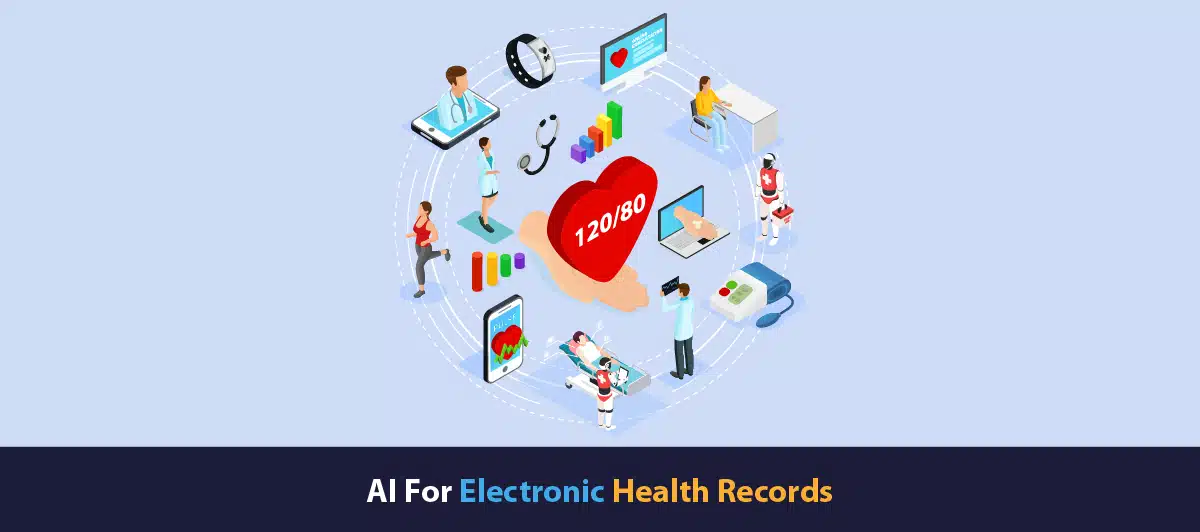Leveraging AI For Electronic Health Records (EMR/EHR) In The Healthcare Sector
Quick Summary: AI in electronic health records streamlines data analysis, predicts patient outcomes; offers personalized treatment suggestions, and optimizes workflow, enhancing efficiency, accuracy, and patient care within healthcare systems. Keep reading !!!
Introduction
Since the introduction of the electronic medical records mandate, healthcare provisions are leveraging electronic health record systems to test and restore all patient information in a single place. A growing number of organizations and professionals are adopting artificial intelligence in healthcare. As a result, artificial intelligence is transforming healthcare.
It is possible, yet, that things might shake up once again as artificial intelligence is now in greater demand than ever. Possibly one of the most influential technological advancements of the last 50 years has been the introduction of Google in 1998. Read this blog to understand how artificial intelligence in electronic health records streamlines medical operations and helps businesses maximize their revenue potential.
What is an EHR/EMR system?
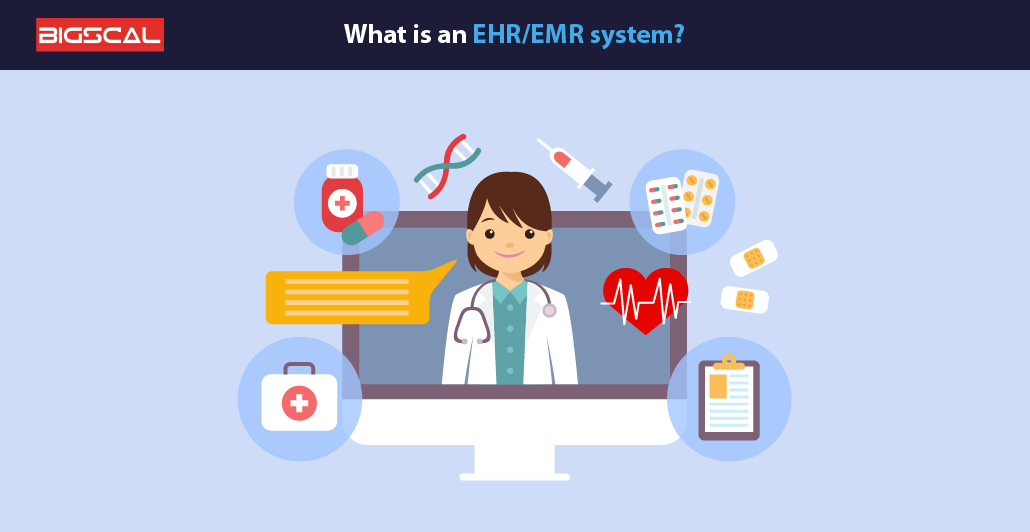
Electronic Health records (EHR) are an indispensable part of the health care system. Furthermore, it transforms the way patient data and information are kept in EHR systems. While these terms (ehr or emr) are often used interchangeably, they symbolize different meanings and concepts within the realm of electronic health records ehr.
Furthermore, an electronic medical records (EMR) is a digital version of all the information about patients; helping doctors access the data on single dashboards. Further, the electronic medical record contains data related to the patient’s medical history and lab tests.
It also encloses diagnoses, medications, immunization dates, allergies, lab results, and other important personal health records and clinical information. Additionally, it provides a remarkable platform for streamlining workflow within a healthcare organization, improving efficiency and accuracy.
Why use AI in electronic health records?
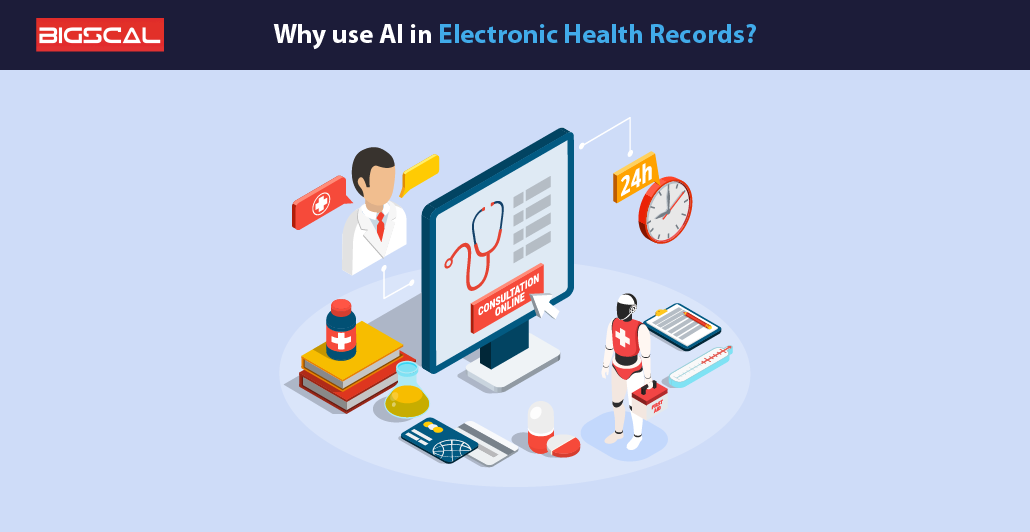
AI in EHR system provides a wealth of benefits to users to ease every arduous task. Furthermore, by leveraging machine learning and AI algorithms, doctors can easily detect diseases at an early stage. Traditionally, medical systems were equipped with an obsolete approach, and it took protracted hours to complete the work.
Sometimes, doctors get annoyed; as handling every part of patient records and paper medical records is tiresome and needs an effective system to maintain the workflow.
These technologies provide better ways for doctors to diagnose their symptoms and understand the stages of diseases accurately. Furthermore, AI helps doctors understand all the deadly symptoms and vital signs properly and take viable treatment plans to provide quality care.
EHR implementation allows the admin department to access the document in one place and enhance patient satisfaction levels. It boasts accurate speech-to-text transcription and a machine learning algorithm; which streamlines health care providers workloads.
Furthermore, by segmenting information according to specific patients, ailments, therapies, and other factors are easily handled. Furthermore, these algorithms can be trained on vast amounts of patient data, which will speed up the retrieval of documents and other data from enormous databases.
Predictive analytics models further improve patient care and operational efficiency within healthcare companies by providing healthcare providers with information on risk prediction and patient satisfaction levels.
How AI transforms Electronic health records through diverse applications
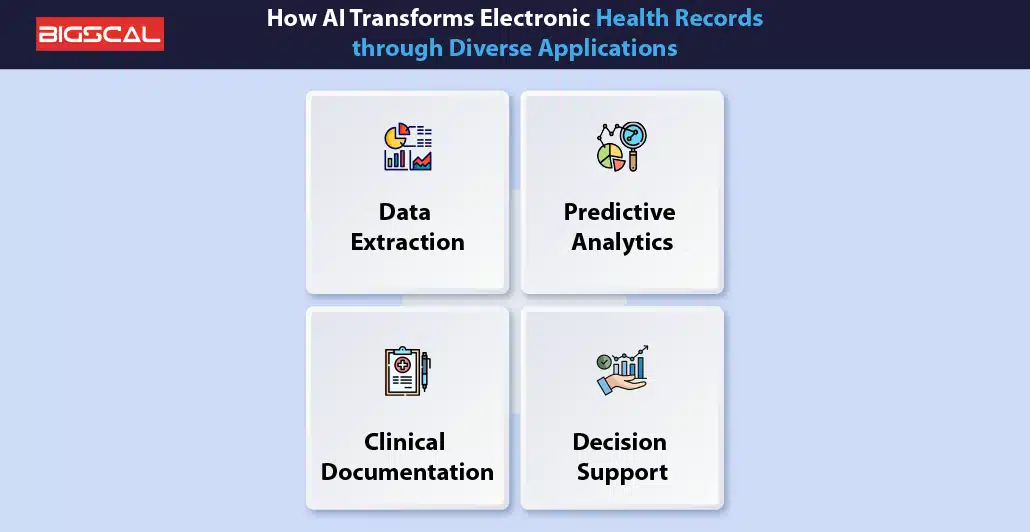
Let’s check out:
1. Data Extraction: AI streamlines arduous tasks and helps hospitals collect data from various resources, such as paper records, and lab test results. Furthermore, all clinical notes, faxes, and provider records, store data can be converted to viable insights. By evaluating all the essential terms and medical information, AI enables healthcare organizations to fetch accurate information and use this data in their care settings and treatment plans.
2. Predictive Analytics: Healthcare provider can use big data and its features to detect the deadly symptoms at the initial stage. Further, by using these predictive algorithms in hospital management software. Healthcare organizations can detect symptoms, drug interactions, and life-threatening conditions. By gauging these conditions; healthcare facilities and service management can easily take proactive measures for quality improvement. Moreover, AI-driven algorithms and medical image interpretation algorithms when incorporated into the hospital system, enhance patient care and safety.
3. Clinical Documentation: Health care organizations use AI tools, health care informatics, and NLP algorithms to easily fetch data from clinical data. This integration with healthcare EMR/EHR software; allows doctors to reduce medical errors and streamline all the backbreaking work that takes long hours to accomplish.
4. Decision support: The integration of electronic health records and artificial intelligence tools provides better ways for doctors to improve patient care. Furthermore, it transforms generic treatment procedures into personalized patient’s care solutions. The widespread adoption of machine learning, helps doctors stay up to date with data and enables customized health plans and treatment strategies for each patient.
In emergencies, electronic health records allow healthcare organizations to manage adverse events and save the lives of patients in difficult circumstances. Furthermore, electronic health records help medical specialists get access to patient healthcare information, medical vital details, and histories. This accessibility is incorporated into hospital management software to retrieve health information from any location. Thus, it facilitates immediate actions, allowing firms to make tangible decisions that create innovations and propel growth.
How to improve the workflow by Electronic Health Records
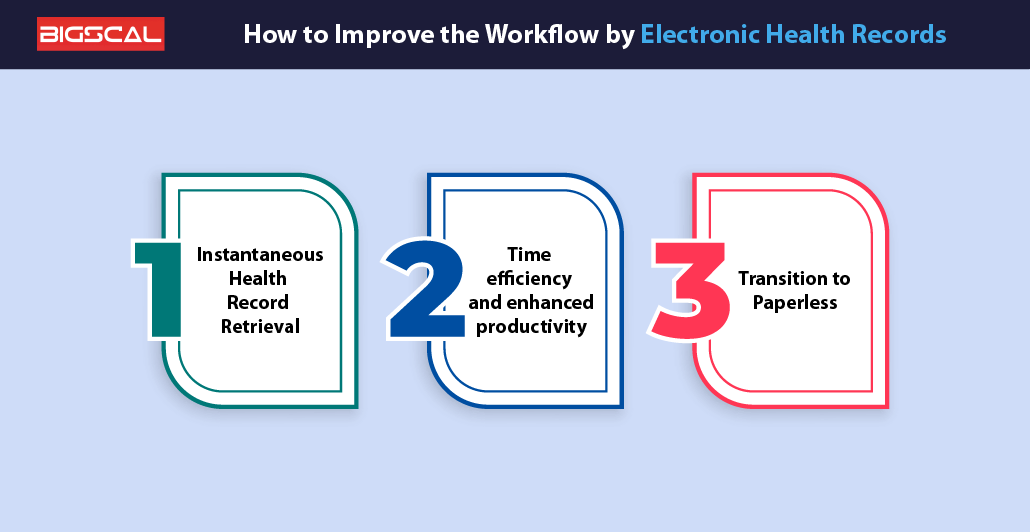
Let’s understand the benefits of the EHR system:
Instantaneous Health Record Retrieval
By embracing electronic health records, doctors can simply log in to the dashboard and check all the details of patients. Additionally, EHR systems are loaded with features that fulfill all the needs of the individual to efficiently lead their healthcare journey. Medical teams can get convenient access to electronic records via a range of mobile devices to help access e mail and other progress notes seamlessly.
Furthermore, electronic health record ehr allow doctors to use cloud technology to check and share reports with other healthcare providers
Time efficiency and enhanced productivity
Electronic Health Records (EHR) provide doctors with easy steps to implement medical practices and handle patient health care seamlessly. Ultimately, helping them to reduce risk and elevate the efficacy of the medical system.Furthermore, they can create customized templates for writing patient health information. Therefore, they can seamlessly communicate and focus on value-added activities, and schedule their workflows. And conduct all the operations with the best strategies and fulfill the requirements more effectively.
Hospitals can easily incorporate the features with other backend methods, helping professionals to minimize additional work pressure. Moreover, healthcare administrators get immense flexibility to work in different scenarios.
Transition to Paperless
Electronic health records have revived the obsolete approach of the medical sector. It helps them evade the arduous tasks of extensive paperwork and keeping the billing information in filing cabinets.
Furthermore, electronic health provides a versatile platform for doctors to ease their medical practices and boost their knowledge in all areas. Moreover, the adoption of medicaid ehr incentive programs,allowing doctors to sidestep the burden of housing huge sets of paper records.
Take a look at Electronic Health Records features
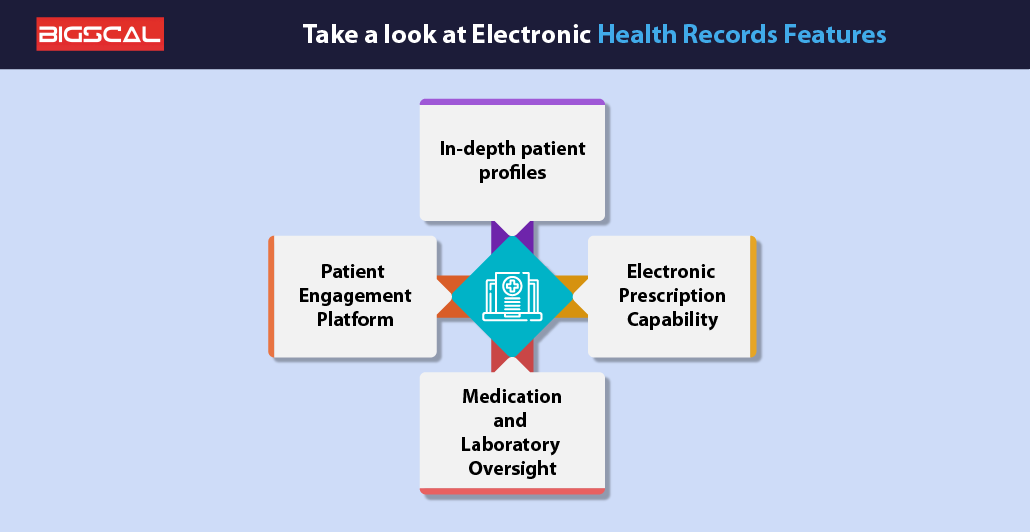
Presently, electronic health records (EHR) use computer systems and allow doctors to access all the information at their fingertips. Furthermore, this seamless integration provides immediate access to health information data, which doctors can easily understand.
Moreover, electronic health records are easily incorporated into billing software. This integration empowers healthcare providers to simplify their complex workflows; elevating the efficiency of the hospitals. Furthermore, by consolidating all the vital patient information on a single platform, healthcare professionals can easily view the essential information and data. Thus, enhancing the efficiency of a patient management software system.
Let’s understand some of the top features of electronic health records software. It helps healthcare organizations streamline intricate activities.
In-depth patient profiles:
The electronic health record provides comprehensive solutions for the doctor to understand every human organ accurately. Furthermore, it helps them take meaningful actions at the initial level.
Furthermore, doctors can check diagnosis reports, laboratory tests, blood samples, prescribed medications, allergy profiles, and additional pertinent information.
Importantly, healthcare professionals can easily assemble this crucial information and convert it into a standardized format. Moreover, various EHR platforms are integrated with features that enable doctors to customize health information for individual patients. Such customization provides outstanding documentation and helps them capture all the vital details of patients seamlessly.
Patient Engagement Platform
A well-integrated EHR software incorporates various features of the patient portal, allowing healthcare providers to check this information and leverage it in their healthcare practices. Previously, it was difficult for doctors to view a complete profile of patients and provide them with better suggestions.
Electronic health records provide remarkable ways to get a clear view of their health history, lab tests, and diagnostic symptoms. Furthermore; empower them to supervise their day-to-day operations seamlessly. Additionally, the patient portal provides efficient ways for doctors to check and access all the details of patients in the portal, without delaying their medical treatments.
Medication and Laboratory Oversight
Electronic health records boast features that integrate log features of both the patient records and laboratory records. Furthermore, doctors can easily check for any deadly symptoms in the patients based on their previous experiences and histories. By understanding the medication’s side effects, physicians can easily check and provide better suggestions to save their lives.
Furthermore, doctors also customize the treatment decisions if they do not fit the patient’s body needs. These features help doctors reduce the inconsistencies in their workflow and interpretation. The Electronic records will help doctors understand patient symptoms more accurately and simplify intricate medical operations.
Electronic Prescription Capability
Electronic health records entail an e-prescription feature, allowing doctors to check the medication and all the details of patient data loaded in a user-friendly software interface.
Furthermore, by embracing these progressive features, doctors can simplify the workflow. This well-integrated healthcare technology provides you with remarkable ways to bypass backbreaking paper-based activities.
These full-featured systems allow physicians to send medical information in a simple digital format. Furthermore, patients can easily get information, sparing them the workload of carrying physical prescription scripts. Thus providing them a better way to check the medical records and manage patient safety.
How AI Serves the Hospital?
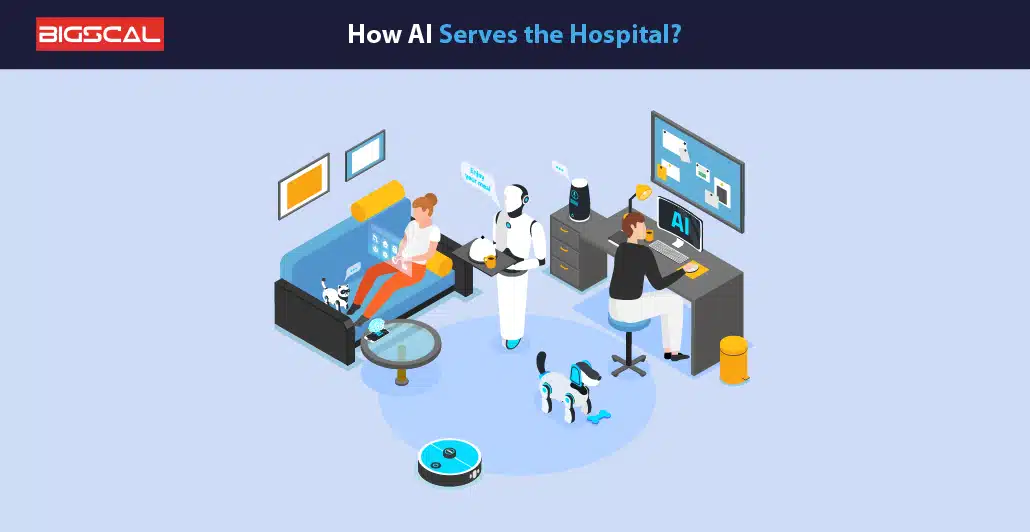
Let’s check out:
Right Personalized Medicine for You
AI-powered predictive analytics provides remarkable ways for doctors to understand the correlations between patients and medication side effects. Previously, businesses were equipped with obsolete approaches, and giving accurate treatment was arduous. AI provides the right data patterns to doctors and helps them understand the disease stages and side effects easily.
Furthermore, these meaningful insights help doctors predict the next stage and treat them at the initial level. Furthermore, healthcare providers can easily customize the treatment and reduce their complete dependency on trial-and-error techniques.
Health care professionals can create individualized treatment plans based on the latest medical evidence and guidelines by implementing an AI-driven framework.
AI provides immense ways for doctors to handle the medication department. Furthermore, doctors can easily create genetic makeup data and customize treatment plans that mitigate the risks in severe cases.
Additionally, AI features allow doctors to understand the acute symptoms and make meticulous; high-impact treatment plans to initiate the case at an early level.
Eases all the operations and elevate efficiency
Integrating artificial intelligence (AI) features in the healthcare system not only improves efficiency but also helps medical sectors maximize their revenue potential.
Furthermore, it greatly impacts the doctor’s work; they can smoothly execute the operations, allocate tasks, and plan the process. AI algorithms can gauge patient data in an easy format; and historical patterns of diseases in real time. Furthermore, AI combined with predictive analytics helps you create innovation in every practice; and raises the efficiency level of the firm. Also, healthcare professionals can easily gauge stock data and prepare strategies to use it efficiently in the system.
These cutting-edge platforms expedite the workflow and provide them with better ways to handle patient care. It helps doctors understand the meaning of data patterns and zones of advancement.
Furthermore, these AI algorithms provide accurate results to doctors and help them prepare tangible treatment plans related to patient records.
By analyzing the right demand, healthcare facilities can minimize financial waste and ensure the right measures are being implemented in the medical system.
Continuous Learning can help you ease the workflow
The incorporation of artificial intelligence provides a better environment and demonstrates a culture of continuous learning and innovation in hospitals. Additionally, by taking proactive in the patient treatment journey, doctors can efficiently check the disease symptoms and reduce disruption. Moreover, AI boasts features such as appointment scheduling, handling patient data, stock control, and workflow optimization. Thus, it reduces the waiting time of patients and helps them get profitable outcomes. These strategies help you assess real-time data patterns; allowing the firm to take proactive action and prevent complications at an early level.
They can easily check bed availability and save time traveling and onboarding. Thus, it helps doctors determine the stages and understand the medical symptoms accurately. These valuable insights provide a wealth of benefits; and help you take impactful actions when allocating staff and resources more effectively.
Quality supervision and wellness
Converging the efficient features of AI in the healthcare system has sparked a significant revolution; providing better ways for doctors to enhance patient care.
Furthermore, it greatly enhances the quality of patient care; and provides a customized approach to doctors in resolving health symptoms. Additionally, AI algorithms help refine treatment ideas based on new data inputs to improve accuracy and effectiveness. Another notable benefit of using AI is that it provides the best way for doctors to keep the workflow systematic.
As a result of these analytics, hospitals can continuously monitor and assess their operations for adequacy. Consequently, patient safety is highly prioritized, providing doctors with better ways to get optimal outputs.
How Bigscal help you get the best solutions
By utilizing artificial intelligence (AI) in hospitals, Bigscal sets itself apart from healthcare industries and provides you with outstanding ways to deal with patients’ health symptoms. And provide an efficient environment for doctors to deal with their patients and provide optimal performance across all hospitals. The full-fledged software creates innovation and helps them stay nimble with the dynamic needs of the patients.
By using this innovative strategy, Bigscal can provide hospitals with state-of-the-art solutions; to stay agile and forefront of health information technology.
By converging the features of AI-driven algorithms and predictive analytics, doctors can easily predict the next stages of diseases. Allocating resources optimally, allows healthcare organizations to expedite their workflows.
Conclusion
Doctors can ease the intricate operations of medical practices and manage patient health care with the use of Electronic Health Records (EHR). Hospitals can create a safe and better environment and leverage the advantages of innovation and learning.
By converging features of artificial intelligence. Healthcare firms can minimize financial waste. Also, ensure that all the guidelines and policies are being put in place. Ai helps hospitals determine accurate stock and reduce manual errors while executing day-to-day operations.
FAQ
What is the application of artificial intelligence that is employed in the medical field?
Lets check out:
- Virtual health assistants
- Chatbot
- Predictive analytics to give doctors the best results and hence their performanc
- Provide accurate disease diagnosis report and detectio
- Personalized treatment plannin
- Medical image analysis (e.g., radiology, pathology
- Drug discovery and development
How does artificial intelligence work in healthcare organizations?
AI is integrated in electronic health records (EHR) for data analysis; predictive analytics, and providing personalized; treatment and recommendations to patients. It optimizes medical operations; improving efficiency; accuracy, and patient care outcomes.
How is AI helpful in electronic health records?
The purpose of artificial intelligence systems is to identify patterns by analyzing large amounts of data using algorithms. It provides tangible ways for doctors to bypass the backbreaking work of doing intricate operations; which typically require human intelligence.
How AI is helping healthcare industries to resolve their complex operations?
Hospitals should take the help of ai tools to determine every stage of diseases and provide them with personalized treatment to cure at the initial level. Predictive analytics. In HMS enhances patient care and outcomes, ultimately saving lives through improved diagnosis, treatment, and decision-making.
How healthcare organizations are using AI to save lives?
AI provides the best ways for doctors to initiate treatments and provides viable insights from patient data. They can easily tailor them to give personalized treatment plans to patients. AI algorithms analyze medical images such as MRIs; X-rays; and CT scans to aid in the detection of abnormalities and diseases.
